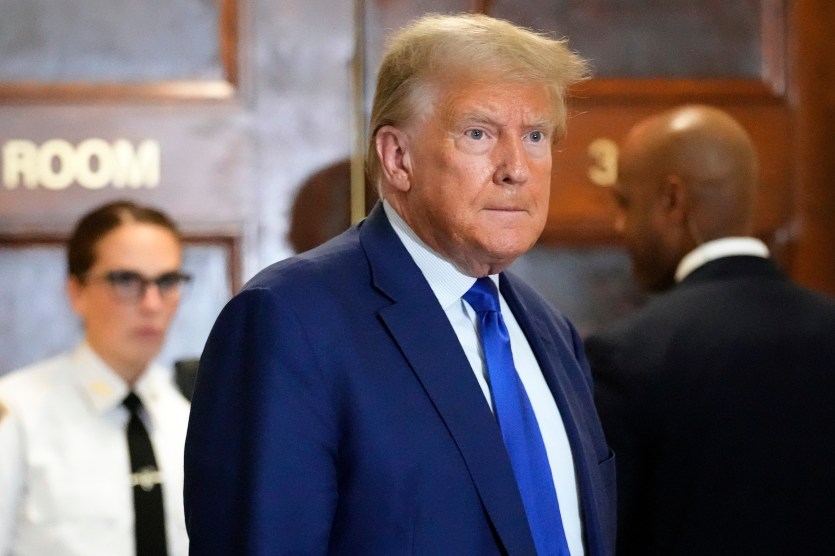
Former President Donald Trump speaks during a break in his civil business fraud trial at New York Supreme Court, Wednesday, Oct. 25, 2023, in New York. Seth Wenig/AP
Donald Trump was forced to take the stand in a New York City courtroom on Wednesday to explain why he once again violated a gag order prohibiting him from disparaging courtroom staff.
Two weeks ago, Trump posted a message on TruthSocial accusing New York Superior Court Judge Arthur Engoron’s court clerk of being Chuck Schumer’s girlfriend and linking to her personal Instagram account. Engoron, who is overseeing the $250 million civil fraud lawsuit against Trump filed by New York Attorney General Letitia James, issued a limited gag order, which allowed Trump to complain about the trial, James, and Engoron himself—but prohibited him from talking about courtroom staff. On October 20, Engoron fined Trump $5,000 after he discovered that a copy of the former president’s TruthSocial statement remained on his campaign website.
On Wednesday morning, during a break in testimony by Trump’s former fixer, Michael Cohen, Trump stepped out of the courtroom and addressed the battery of television cameras and still photographers waiting outside. Engoron was “a very partisan judge,” Trump said, “with a person who’s very partisan sitting alongside him, perhaps even much more partisan than he is”—seemingly referring to Engoron’s clerk, who sits directly to the judge’s right.
Did Trump violate the gag order by citing the clerk? After the Associated Press published an article reporting the comments, Engoron stopped the morning proceedings to demand an answer to that question. “I am very protective of my staff,” Engoron said. “I don’t want anyone to get killed.”
Trump’s attorneys said his client was referring not to Engoron’s clerk but instead to Michael Cohen, who during the morning session sat about eight feet from the judge, to his left at the witness stand, which is several feet below the judge’s bench, with a barrier between the two.
The clerk’s presence at the judge’s side has been a continual irritant for Trump’s team, particularly his attorney Alina Habba, who earlier in the day had complained that she thought the clerk had rolled her eyes and whispered to Engoron too much while Habba was trying to question witnesses.
At the start of the afternoon session, Engoron brought the issue of Trump’s statement again, and declared he was going to hold a hearing on whether Trump had violated the gag order. He then ordered Trump to the witness stand as the first witness.
Trump, who had just entered court with a visible scowl on his face, stood and picked his way through the courtroom, gingerly stepping around cables and the court reporter. A bailiff swore him in and Engoron began to question him about who he had referred to when talking to reporters earlier that day.
“You and Cohen,” Trump testified. When Engoron followed up with more questions, Trump began rambling about how the campaign website had kept up his earlier comments, a seemingly unrelated issue.
Engoron was not impressed with Trump’s testimony and dismissed him as a witness, sending the former president trudging back to his seat, his face difficult to read, but not nearly as angry and defiant as it had been when he had entered the court a few minutes before.
“As the trier of fact, I find that the witness is not credible, and that he was referring to my law clerk,” Engoron ruled. “I hereby fine you $10,000, which is on the liberal side, to be paid within 30 days.”
Trump’s various attorneys all stood to protest, continuing to argue that Trump had meant Cohen.
“The ruling stands, don’t do it again or it will be worse,” Engoron stated.
Trump, who faced away from the audience, did not show a visible reaction.










